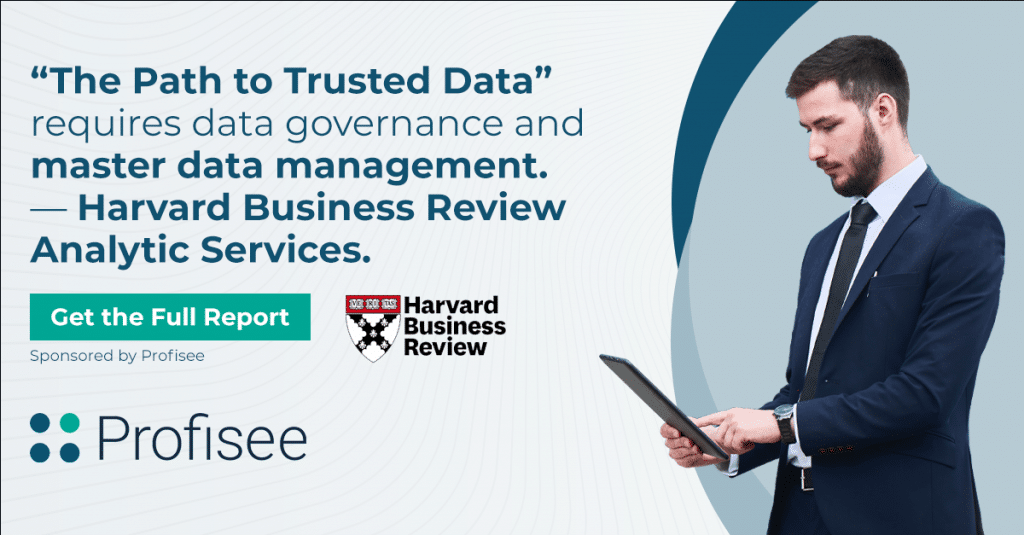Today, organizations of all sizes seek to leverage their ever-growing enterprise data as a strategic asset. Whether through formalized data governance programs or simply building a stronger data culture, they pursue these initiatives because they see data as the fuel for innovation and agility — and key to their survival in today’s business landscape.
While organizations consider data to be a strategic asset and business imperative, 60% believe their organizations are under-investing in their enterprise-wide data strategy, preventing valuable data from being used more broadly, according to a recent Profisee-sponsored survey of 343 executives by Harvard Business Review Analytic Services.
This lack of investment in ensuring that their data is trustworthy is out of step with its importance. Virtually all (96%) say it is very or moderately important, but less than half (45%) say they are putting a great extent of work toward ensuring their data meets this standard. As a result, most respondents feel their organizations are not ahead of their competitors.
Titled, “The Path to Trustworthy Data,” this free report includes interviews with MDM implementers and data management experts and data management statistics from executives across the globe and several industries.
Key findings include:
believe they are under-investing in their enterprise data strategy
say their data strategies are falling behind their competitors
say master data management is important to their future success
who have employed MDM say it is moderately or very effective
The Current State of Enterprise-Wide Data Quality:
This new research from Harvard Business Review Analytic Services comes at a time when 60 percent of executives believe their organizations are under-investing in their enterprise-wide data strategy, prohibiting valuable data from being put into widespread practice.
In the wake of this low data maturity, companies are awash in data problems — including inaccurate/incomplete data and data silos (87% each), inconsistent data formats (80%) and poor enterprise data governance and conflicting information between data sources (77% each). The problem is increasing as well, as 82% of respondents expect the number of different data types used in their organization’s business operations to increase over the next two years.
As a result, many organizations believe they are falling behind their competitors in their data management strategy — only 31 percent of respondents somewhat agree or strongly agree that their organization’s enterprise-wide data strategy is more effective than that of their competitors.
These are just a small sample of the data management statistics available from Harvard Business Review Analytic Services. Download the full report to benchmark your data management strategy and learn the strategies experts recommend to leverage enterprise data as a strategic asset.
Today, organizations and their data quality strategies are suffering because of…
Low Data Maturity
Low Data Maturity
Data Types Expanding
Data Types Expanding
Hesitant to Act
Hesitant to Act
Many Data Issues
Many Data Issues
Under-investing in Data Strategy
Under-investing in Data Strategy
Ignoring Important Steps
Ignoring Important Steps
Executives Hesitate on Data Governance and MDM Despite High Effectiveness
Executives generally agree on the key steps required to improve their data management strategies, as two-thirds (67%) of respondents cited data governance as most critical and over half (55%) cited master data management (MDM).
However, too often companies do not implement them because of their inability to gain support from others in the organization who do not understand the technology or do not immediately appreciate its benefits.
That hesitancy is self-defeating considering that the survey reveals that MDM and data governance are highly effective when implemented, as 70% of respondents whose companies have implemented data governance say their organizations’ approach to enterprise-wide data governance is moderately or very effective today.
Even a greater number (74%) of respondents whose companies have employed master data management say their organizations’ approach to MDM is moderately or very effective. More importantly, 87% of all respondents believe having a strong MDM program is important to ensuring the future success of their organization.
“You can’t deliver the benefits of data governance without master data management (MDM). If you try governance without it, you might have some short-term success, but it won’t sustain.”
— Nicola Askham, Director of the UK chapter of the Data Management Association
Experts on Steps Toward a Better Data Strategy
Despite these challenges and the current state of enterprise-wide data management strategies at many organizations, the Harvard Business Review Analytic Services report features key steps toward a better data strategy.
Here are steps experts say can enable companies to achieve the data management they need:
- Re-frame the data management conversation
- Go beyond data governance and implement MDM
- Demonstrate the impact of poor data management
- Promote data literacy and a strong data culture
- Working iteratively and building on past success
Read the report and learn practical steps to start your digital transformation today
Re-frame the data management conversation
Go beyond data governance and implement MDM
Demonstrate the impact of poor data management
Promote data literacy and a strong data culture
Working iteratively and building on past success
Learn more about data quality, data management, data governance and master data management from data executives who have implemented these implementations first-hand, as well as industry leaders and academics who study effective data management.
This Harvard Business Review Analytic Services report includes insights and recommendations from experts in the field, including:
- Nicola Askham, Director of the UK Chapter of the Data Management Association (DAMA)
- Peter Aiken, Associate Professor of Information Systems at the Virginia Commonwealth University
- Cliff Miller, Enterprise Data Architect at Domino’s
- Aaron Gorham, Enterprise Master Data Manager at J.R. Simplot Company
“The conversations about data governance and master data management are often framed in the wrong way. We frame the conversation in terms of how data can make the business more effective—that’s when you capture people’s attention and buy in.”
— Cliff Miller, Enterprise Data Architect at Domino’s
Download the Full Report Today
Don’t let low-quality data derail your business initiatives. Learn how you can accurately analyze customer purchasing patterns, improve operational efficiency and more with trusted enterprise data.
See how you compare to the hundreds of executive leaders surveyed by Harvard Business Review Analytic Services and download the full, free report to see the full survey results with data management statistics, which investments experts consider most effective and how to build stakeholder engagements for your own data initiatives.
Nearly half (47%) of respondents reported that their organization does not put sufficient effort into master data management because it is considered too hard, expensive, and/or time-consuming. Unlike other vendors in the MDM market, Profisee makes MDM an easy and natural foundation for enterprise data-management strategies and is built to be fast, affordable and scalable.
Contact us today so you can implement MDM in months, prove ROI quickly and scale to additional domains and use cases as you embark on the path to trustworthy data.

Forrest Brown
Forrest Brown is the Content Marketing Manager at Profisee and has been writing about B2B tech for eight years, spanning software categories like project management, enterprise resource planning (ERP) and now master data management (MDM). When he's not at work, Forrest enjoys playing music, writing and exploring the Atlanta food scene.












